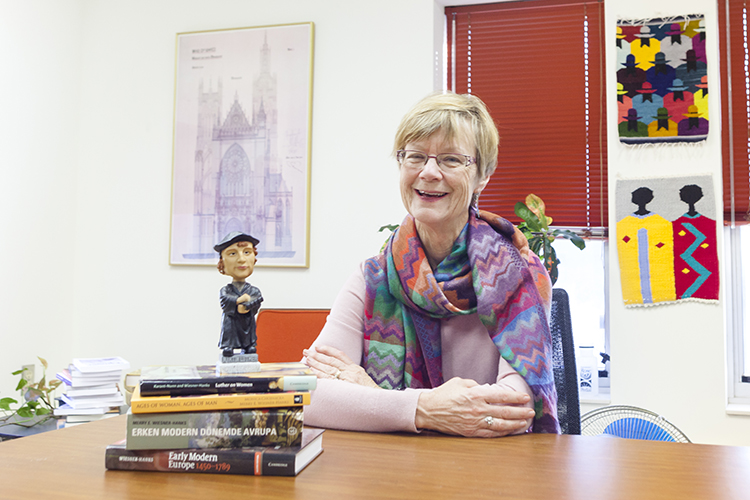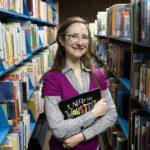This year is the 500th anniversary of the publication of Martin Luther’s famous “95 Theses,” often viewed as the event that triggered the Reformation.
For Merry Wiesner-Hanks, it’s an opportunity to reflect on the upheaval of the European Reformation, but also its echoes in today’s world.
Wiesner-Hanks, a UW-Milwaukee distinguished professor of history and women’s and gender studies, is an internationally recognized scholar of early modern Europe, especially issues of gender and the Protestant and Catholic Reformations. She has written extensively about Luther, the Reformation and modern Europe, and has translated a number of writings by Luther and accounts by his contemporaries.
The phenomenon of religious refugees is one we share with the Reformation, Wiesner-Hanks points out.
“Some say we should consider expulsion of the Jews from Spain in 1492 as the beginning of the Reformation, because it marks the beginning of a period of mass religious refugees,” she says.
Another parallel: Just as the Roman Church may have looked askance at a German friar starting his own version of Christianity, today we see the future of Christianity is no longer solely in the hands of Europeans and their descendants around the world.
“The big kickoff of the ‘Luther Year’ took place last fall in Lund, Sweden, and featured Pope Francis and Bishop Munib Younan, then head of the Lutheran World Federation,” she said. “Here you had an Argentinian and a Jordanian representing these two great religions.”
Wiesner-Hanks noted that both leaders spoke directly to the question of refugees.
“The Amish, Hutterites, Mennonites all came to America as religious refugees,” she says. “Now we see Yazidis, Syrians and others leaving their homes to escape conflict and persecution.”
From the outset, a large portion of Wiesner-Hanks’ career has been devoted to social history, particularly the lives of women in early modern Europe. She was honored at the Sixteenth Century Society and Conference in October, along with frequent collaborator Susan Karant-Nunn, for her pioneering work on gender in the Reformation.
“You can’t talk about the Reformation without talking about gender,” Wiesner-Hanks says.
Among her many publications is “Luther on Women: A Sourcebook,” a collection of Luther’s writings selected and translated by Wiesner-Hanks and Karant-Nunn. The book includes some of the so-called “table talks,” accounts by friends and students of discussions with Luther at his dinner table, which could have 20-30 guests on any given night.
“They are great fun,” she laughs. “Chitchat lubricated by his wife’s beer.”
Luther had a complex view of women. He was opposed to a celibate clergy, maintaining that sex was natural (though he viewed original sin as largely sexual in character). Moreover, as a seminarian and friar, his exposure to women was mainly as servants, and he shared with his male contemporaries a somewhat disdainful view of women.
But Wiesner-Hanks also came to see that Luther was deeply devoted to his wife and daughters. The loss of a daughter comes alive in a moving letter to a colleague.
“He’s just choked up with emotion,” she says. “You can just hear it through the centuries.”
So, while Luther was as chauvinistic as any of his contemporaries, “I ended up having a more positive view of Luther than I expected.”
In more recent years, Wiesner-Hanks has turned her scholarship toward world history, and so puts the European Reformation in a global perspective.
In her book “Religious Transformations in the Early Modern Period,” she examines religious changes and developments in the same time period in other parts of the world, examining them in a comparative way.
An example is Sikhism, whose founder, Guru Nanak, is an exact contemporary of Luther. He has similar views: He rejects asceticism in favor of family life, argues that scripture should be in the language people think, and he’s a monotheist.
One may wonder why the European Reformation is echoed in other reform movements, such as Sikhism, and in China, Confucianism.
“Some of it’s related to technology, notably the printing press, but also just a general reaction to a kind of staleness in the dominant religious of those times and places,” Wiesner-Hanks says.
The printing press was certainly a boon to Luther, allowing his writings to be broadly and quickly disseminated. In some years, a quarter of the books printed in Germany were written by Luther.
“He’s the first person to really brand himself, “Wiesner-Hanks says. “He was trying to persuade persons by argumentation, but also by PR.”
Consequently, she says, Lutheranism spread with astonishing speed: Within 10 years it was adopted in Scandinavia and many German principalities and cities.
The anniversary has put Wiesner-Hanks in demand as a speaker. During the Year of Luther, she’s given talks around the country, as well as locally. Her next talk is at the Osher Lifelong Learning Institute on Nov. 13.
Wiesner-Hanks regards the recognition by the Sixteenth Century Society and Conference, the primary scholarly society of the period, as a validation of a dramatic change in Reformation scholarship.
“When I started in the biz, there were basically no women, and nobody talked about women,” she laughs. “Now Reformation studies has become very gender-conscious.”
But she’s also personally pleased with the honor.
“They never do that, so we were really flabbergasted.”







